Puerto Rico is a mostly Spanish-influenced country that is a territory of the United States.
That means you do not need a passport or a visa to live in or visit the country.
This area is home to many US military families and individuals from the mainland of the United States.
There are many excellent pros associated with living in Puerto Rico.
However, there are some significant cons to consider as well.
Knowing what to expect and the benefits and downsides of living in this island paradise are essential to determine if it is the right environment for a new home.
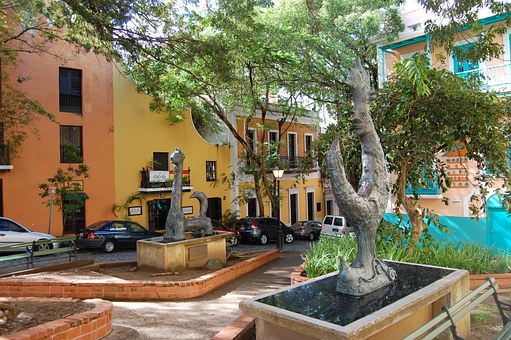
Contents
Pros of Living in Puerto Rico
Puerto Rico is a beautiful country filled with friendly people and scenic landscapes.
However, there are plenty of other Pros to look forward to before moving to this island nation.
1. Warm Tropical Weather
Puerto Rico is located very close to the equator and in a tropical Caribbean area.
That means this country has very mild winters and hot conditions most of the year.
In fact, during the summer, Puerto Rico can be very hot and humid.
This warm weather lends to the tropical atmosphere and encourages plenty of outdoor activities to beat the heat or enjoy fun in the sun.
2. Festive Holiday Seasons
Puerto Rico is known for its festive holiday seasons.
Although they may not celebrate the same holidays as the mainland United States, the ones they do honor are filled with festive decorations, festivals, and unique cuisines.
For example, Christmas is celebrated in Puerto Rico for much longer than in the United States, with much more fanfare.
3. Bilingual Residents
Most people on the island of Puerto Rico speak both Spanish and English.
However, there may be instances where some residents only speak Spanish, but the majority of American natives will have an easy time navigating the island and communicating with the locals.
Before moving to Puerto Rico, it is encouraged to learn some Spanish to help navigate some areas or to communicate with individuals who do not speak English, because it will make your time there much more manageable.
4. Friendly Residents
The people of Puerto Rico are generally very friendly and welcoming to tourists and new residents.
They have a strong sense of community and a warm, inviting spirit.
Most people who move to Puerto Rico feel at home and quickly become part of the community where they decide to settle.
It is a great place to raise a family and spend quality time with them during downtime or after work.
5. Incredible Food
Puerto Rican food has unique flavors that are a blend of many cultures.
It is a mix of traditional Latin cuisine, Spanish influences, and native Caribbean inspirations.
Puerto Rican food is full of flavors and spices and is world-renowned for being delicious and versatile.
Anyone who is a food connoisseur who enjoys eating food with many flavors and wide diversity will love the cuisine of Puerto Rico.
6. Casual Dress
Most individuals living in Puerto Rico dress casually every day, even when they go to work.
Whether they are professionals or working-class, most people tend to dress for the warm climate by wearing loose-fitting clothing and sandals or flip-flops.
It is rare to encounter individuals dressed in suits or business attire.
That means it is more acceptable to be comfortable year-round in this relaxed island nation.
7. Familiar Companies
Because Puerto Rico is a US territory, many companies firmly settled into the US infrastructure are also found commonly across Puerto Rico.
This helps individuals settle in and feel more comfortable in their new homes.
These companies can provide familiar consumer products and services that make life easier.
8. Plentiful Foods
Because Puerto Rico is located in a warm climate and has rich volcanic soil, plenty of crops are grown directly on the island.
Year-round, residents and visitors can find staple vegetables and special items for preparing both local and international dishes.
It is easy to purchase and find food regardless of the season, if you live in Puerto Rico.
Puerto Rico can also import products from the United States quickly so that many familiar food items will be available on the island.
Cons of Living in Puerto Rico
There are many benefits for individuals who decide to locate in Puerto Rico.
However, there are several downsides to consider before making a decision.
It is important to consider all aspects of living in an area to understand what to expect and prepare for them.
1. Poor Economy
Unfortunately, Puerto Rico has a somewhat poor economy.
There are many impoverished residents with little income and few job prospects.
There is a lower pay rate and fewer luxury products and services available in certain areas.
It is something to be mindful of as a visitor or new resident to the country.
The individuals of Puerto Rico have a less wasteful mindset and strive to make the most of what they have.
2. Cars are More Expensive
Cars are much more expensive in Puerto Rico than on the mainland.
One reason there is a price difference is that cars must be imported and maintained according to factory standards, requiring special mechanics trained in the brand’s protocol.
Anyone considering moving to the Island of Puerto Rico without a car or truck may want to consider purchasing one on the mainland and having it shipped to the island to save money on a new vehicle purchase.
Keep in mind that the island’s transportation in terms of buses and other public transit may not be available in some areas, so those who want access to all parts of the island will need their own vehicle.
3. Private Schools are Necessary
Unfortunately, getting a good public education in Puerto Rico may be very difficult.
Individuals with children living on the island are recommended to check out their local private school options to get the best possible education.
While this may be an extra expense, the affordable way of life on the island makes budgeting for private schools much easier than it would be in the mainland United States.
4. Cultural Differences
Before settling in Puerto Rico, you must understand the potential cultural differences you may encounter.
Please make a point to learn as much about the area and its people and cultures as possible and be considerate and kind concerning those cultural differences.
Learning more about any culture helps create a better connection and understanding of how people live their lives in other areas, including Puerto Rico.
5. Difficulty Shopping Online
There are a few reasons why shopping online and in Puerto Rico may be difficult.
There may not be a steady internet connection in some areas, and even if it is possible to place orders, you may have trouble receiving delivery on the island.
It may take some time to figure out how to get any online shopping done, but many retail stores on the island are likely to carry most of the items people may want.
6. Dangerous Hurricane Season
Since Puerto Rico is located in the Caribbean, it is exposed to frequent and sometimes very intense hurricanes.
In fact, Puerto Rico is hit by multiple hurricanes during some seasons.
Anyone planning to move to the island should prepare themselves for hurricane encounters and learn how to take the proper precautions.
7. Poor Public Transportation
Unfortunately, Puerto Rico has poor public transportation in many areas.
While there may be a network of buses or taxis in the urban areas, some towns throughout the island do not offer convenient options.
It is best to have a vehicle of your own but keep in mind that purchasing a vehicle on the island is quite expensive, so shipping a vehicle from the mainland may be a good alternative.
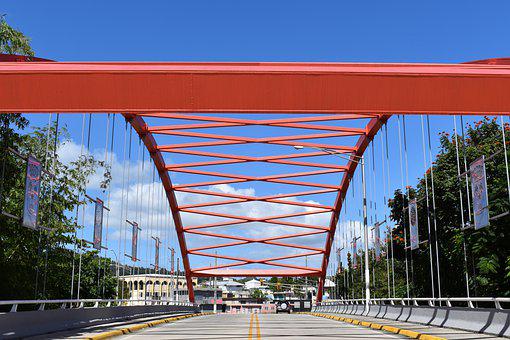
Pros and Cons of Living in Puerto Rico – Summary Table
| Pros of Living in Puerto Rico | Cons of Living in Puerto Rico |
|---|---|
| 1. Warm Tropical Weather | 1. Poor Economy |
| 2. Festive Holiday Seasons | 2. Cars are More Expensive |
| 3. Bilingual Residents | 3. Private Schools are Necessary |
| 4. Friendly Residents | 4. Cultural Differences |
| 5. Incredible Food | 5. Difficulty Shopping Online |
| 6. Casual Dress | 6. Dangerous Hurricane Season |
| 7. Familiar Companies | 7. Poor Public Transportation |
| 8. Plentiful Foods |
Puerto Rico Safety Overview
READ THE FULL REPORT: Puerto Rico Safety Review
Safety Index: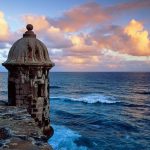
- OVERALL RISK: MEDIUM
- TRANSPORT & TAXIS RISK: MEDIUM
- PICKPOCKETS RISK: LOW
- NATURAL DISASTERS RISK: MEDIUM
- MUGGING RISK: LOW
- TERRORISM RISK: LOW
- SCAMS RISK: MEDIUM
- WOMEN TRAVELERS RISK: LOW
Frequently Asked Questions
What is the highest elevation in Puerto Rico?
The Municipality of Ponce is Cerro Punta, which is the highest peak in the Cordillera Central.
This peak rises 4,390 ft above sea level.
One exciting fact about this mountainous area is that you can drive through most of it to get fantastic views of Puerto Rico.
The island is well known for having many landscapes, including plenty of mountainous terrains, which are ideal for hiking and other outdoor activities.
What is the average annual rainfall in Puerto Rico?
The average annual rainfall in Puerto Rico is 31.3 inches.
However, due to weather systems or tropical activity, Puerto Rico may have extreme rainfall events.
There tends to be more rainfall in certain areas as opposed to others due to the terrain, such as mountains.
What area of Puerto Rico has the highest level of criminal activity?
The areas in Puerto Rico with the highest crime rate include some areas of San Juan, Carolina, Vega Baja, and Bayamon.
Before moving to Puerto Rico, research crime rates in particular areas and try to avoid frequenting or settling in those areas.
Many sections of Puerto Rico are relatively safe and offer a high quality of living.
What is the most densely populated city in Puerto Rico?
San Juan, Puerto Rico, is the most populated area of the island, with over 395,000 people residing within the city itself.
However, there are other densely populated areas sprinkled across the island.
San Juan is a hub of almost every industry in the country.
There is plenty to do and see with great shopping and most of the luxuries and commodities that individuals in the U.S. are used to having at their disposal.
The great thing about Puerto Rico is that the island is relatively small, so you can get to San Juan in a short time, no matter where you live.
Is it expensive to live in Puerto Rico?
Puerto Rico is very affordable compared to almost anywhere in the United States.
The statistics show that individuals can live comfortably on about $2,000 per month.
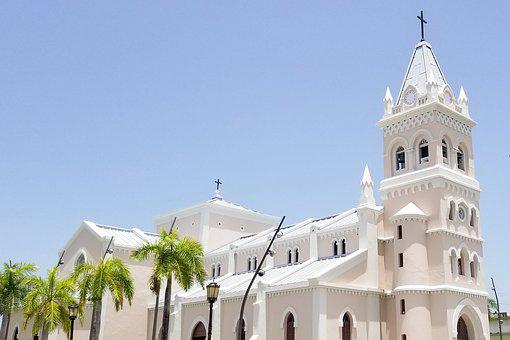
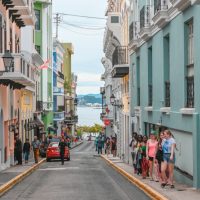
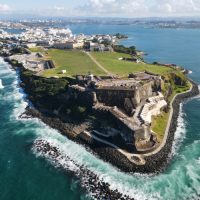
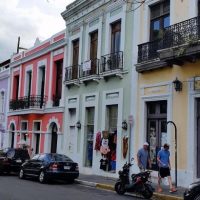

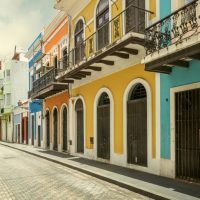
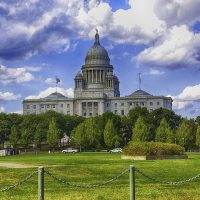





Do they, Puerto Rico have train and railway services?
Yes, but it is no very good, having a car is a must to move around.
The train is in the San Juan metro area.
Dirtiest bathroom of any airport i have seen!
I did not find them dirty!
The bathrooms were very clean when I was there. The worst I’ve ever seen were in Orlando- yuck!
I’m with you on that! Orlando’s Airport bathrooms have a strong odor of Urine. NASTY!
Traffic is a challenge at night nobody stops at red lights. they are afraid of getting robbed or kidnapped.
Stay away from here if you don’t have much money saved or invested. If you are a mainlander citizen, you will get tax benefits for becoming a bona fide resident. If you have money, then buy an expensive house in Dorado or somewhere safe, and you will be ok.
Where is the cheapest “somewhere safe” because my lil family is dying here homeless on the mainland and I want OUT!
Sorry to be so blunt, but it will be much worse on the island. Food in Puerto Rico can be twice as expensive than on mainland. Very little is actually grown or produced on the island and they import everything and that increases prices significantly.
They also have the HIGHEST sales tax of any of the US states/territories.
It’s not a good place for the elderly (especially those needing care) because there are constant power and water outages. You will need a lot of money to protect yourself from these…and if you don’t you will suffer not only for actual time with no service but also you constantly have to spend extra money on groceries because what you had in the fridge/freezer spoils during the outage (consider the high heat and humidity!).
Finally, there aren’t many doctos on the island…so will struggle GREATLY to find timely care for your ailing family members.
Puerto Rico is not a place that you want to be poor in. Unless you have family that is willing to take you in while you get on your feet, you will end up living in crime and drug-infested public housing. Getting on your feet means overcoming whatever it was that led you to become homeless on the mainland. Fight the battle right where you are.
Puerto Rico ranks very low on road safety…every week you will hear about a pedestrian being killed (usually older people) or several fatal car accidents…the rate is high for such a small island.
I have to disagree with the Incredible food opinion…I love the food, but unfortunately it is really lacking in healthy components. Due to being a small island hardly any local vegetables are available and the diet is very low on that.
Not undercutting the advantages of US citizenship, but its worst side effect is the welfare mentality set in motion by the democratic party. Not that the Spaniards didn’t leave us with the cultural baggage of relying on the central government to supply the island. But once we figured out that Spain didn’t care about us because we had no gold, Puerto Rico began to become more self-reliant. Then Uncle Sam pulled off its hostile takeover. Turbulent and unsure times ensured, and things did not get better when WW1 and the depression kicked in. Uncle Sam did do a lot to “build back better” the economy, but the mismanaging Commonwealth politicians kept asking for handouts to help the masses and in less than a generation, it made more sense for many people not to work and just live off of welfare. In short, rapid post-WW2 industrialization led to less agriculture. Deflated industrialization eventually led to unemployment, and now few people know how to grow food or even have the desire to do so as long the EBT is charged up every two weeks.